Unit 3 To be a good learner重点知识 译林版(2024)八年级英语上册
文档属性
| 名称 | Unit 3 To be a good learner重点知识 译林版(2024)八年级英语上册 | 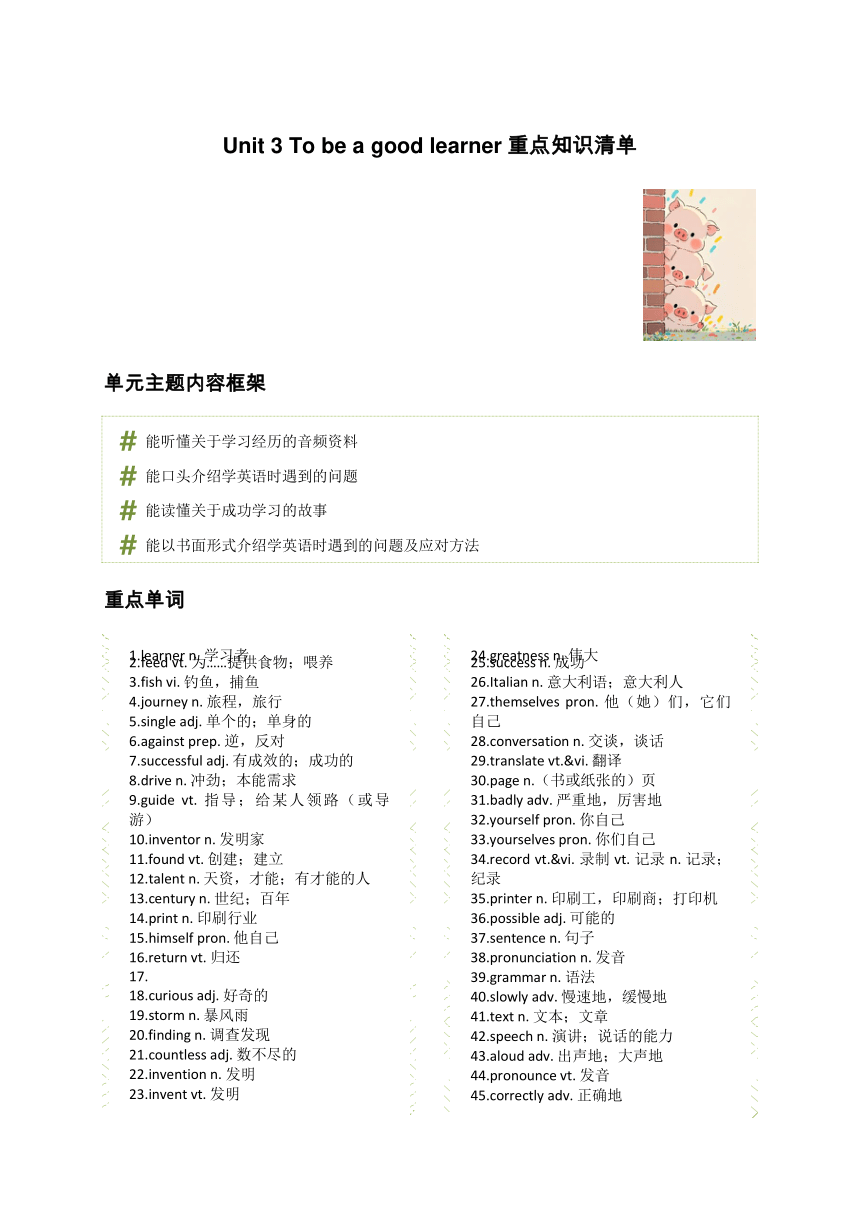 | |
| 格式 | docx | ||
| 文件大小 | 591.7KB | ||
| 资源类型 | 教案 | ||
| 版本资源 | 译林版 | ||
| 科目 | 英语 | ||
| 更新时间 | 2025-08-20 11:57:12 | ||
图片预览

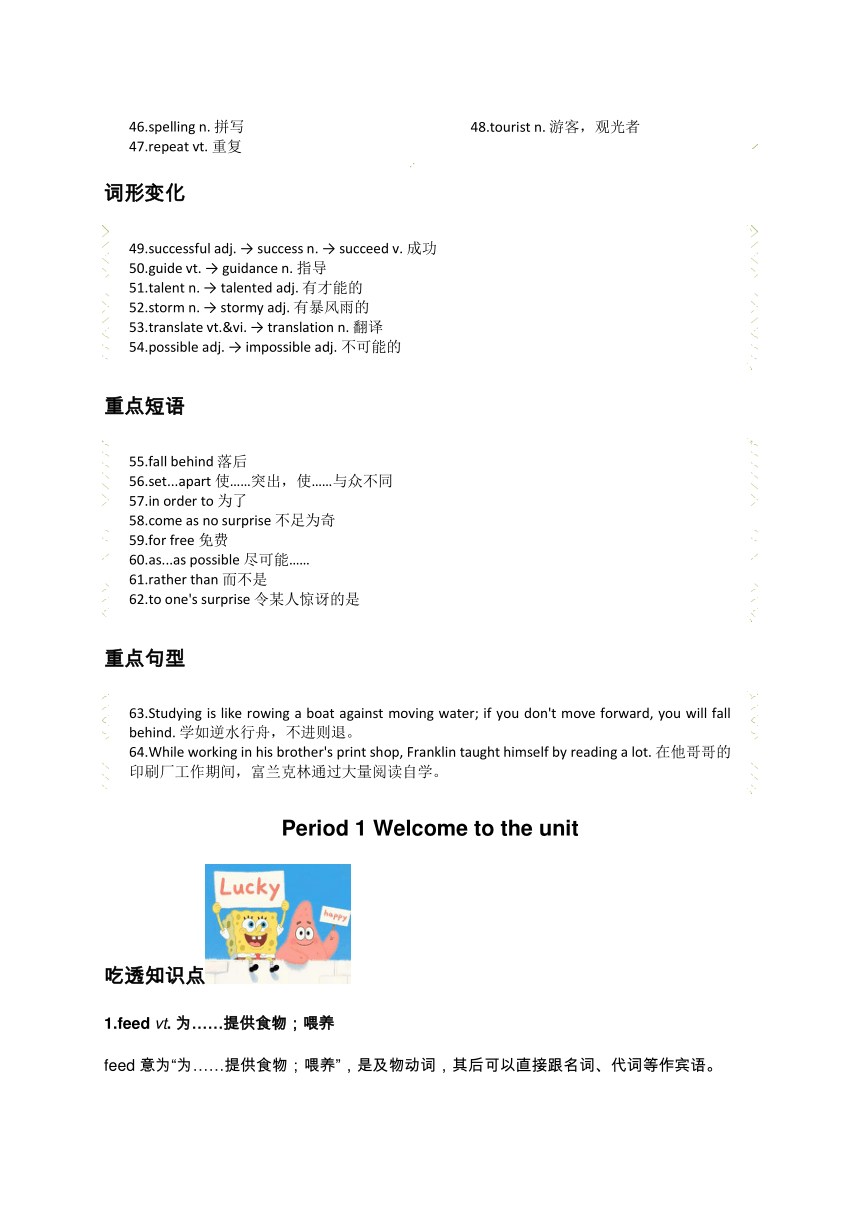
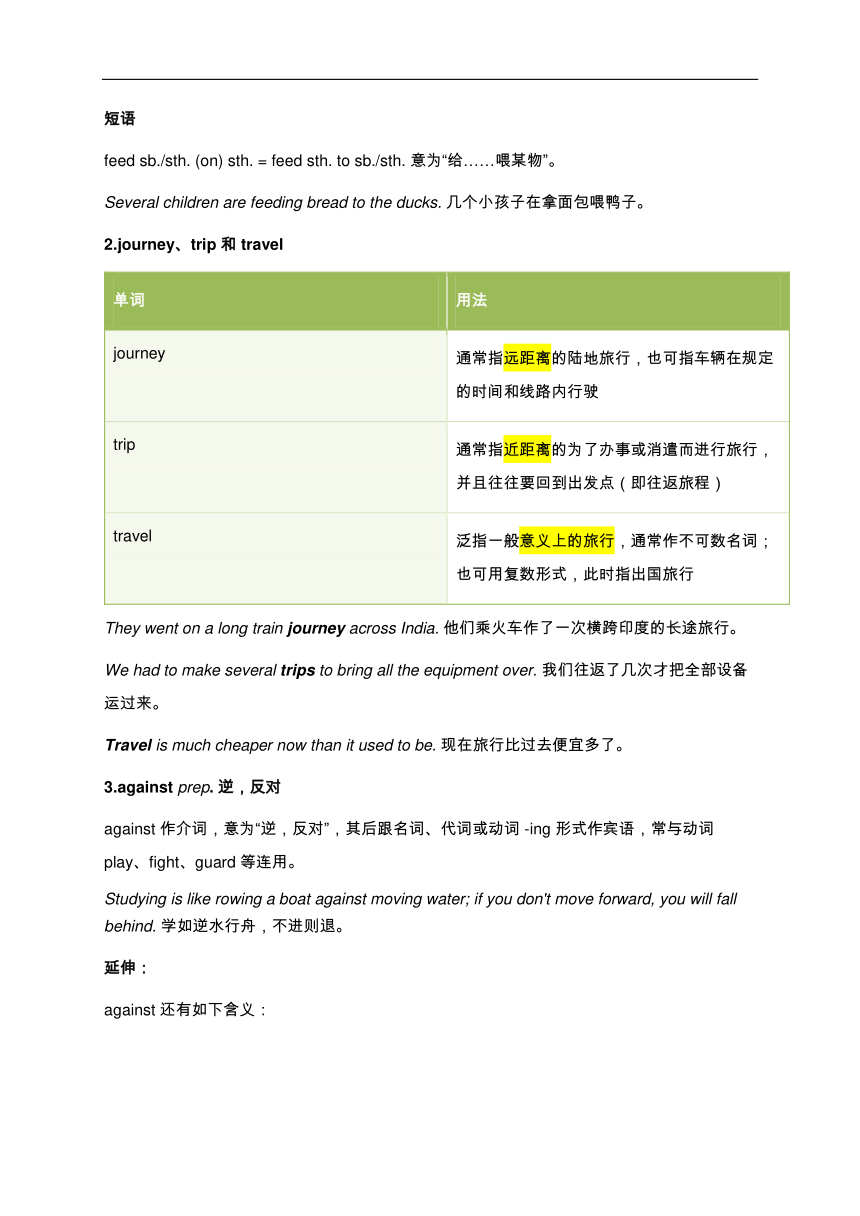
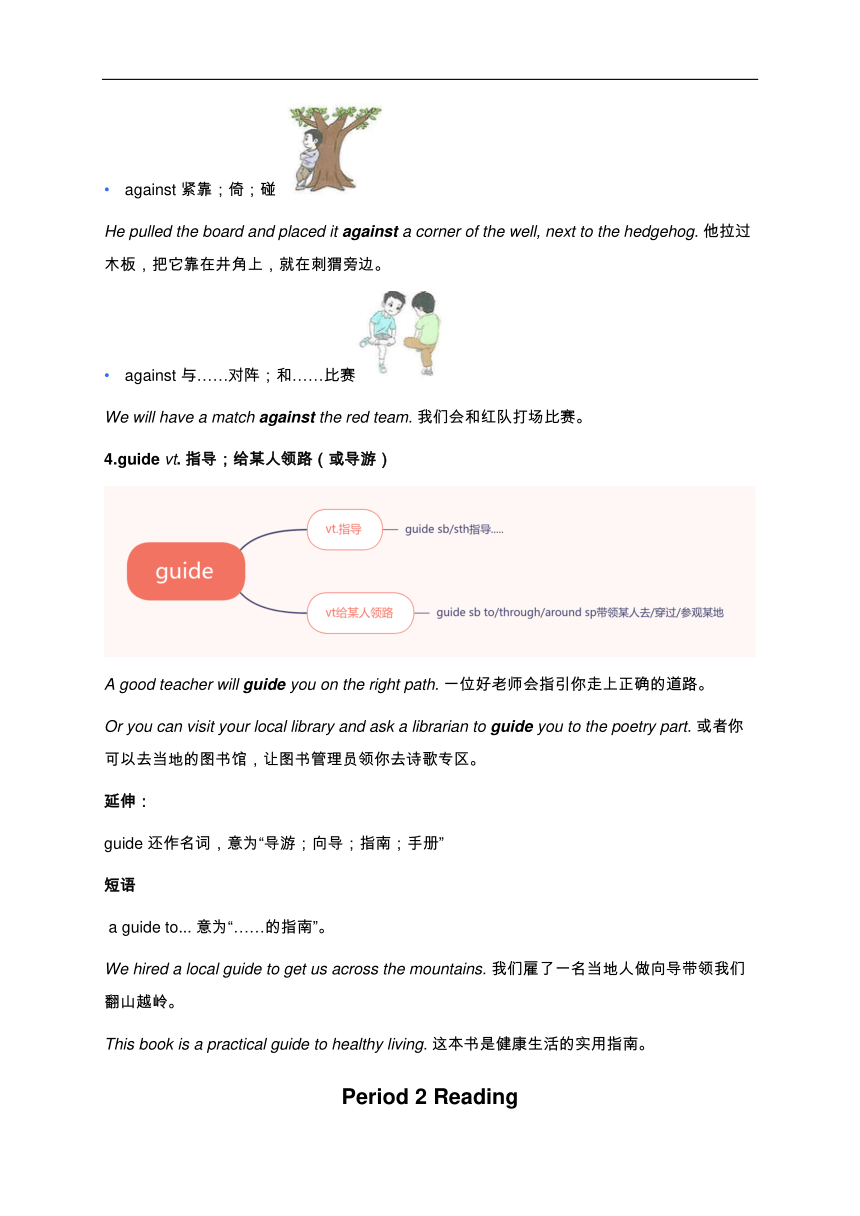
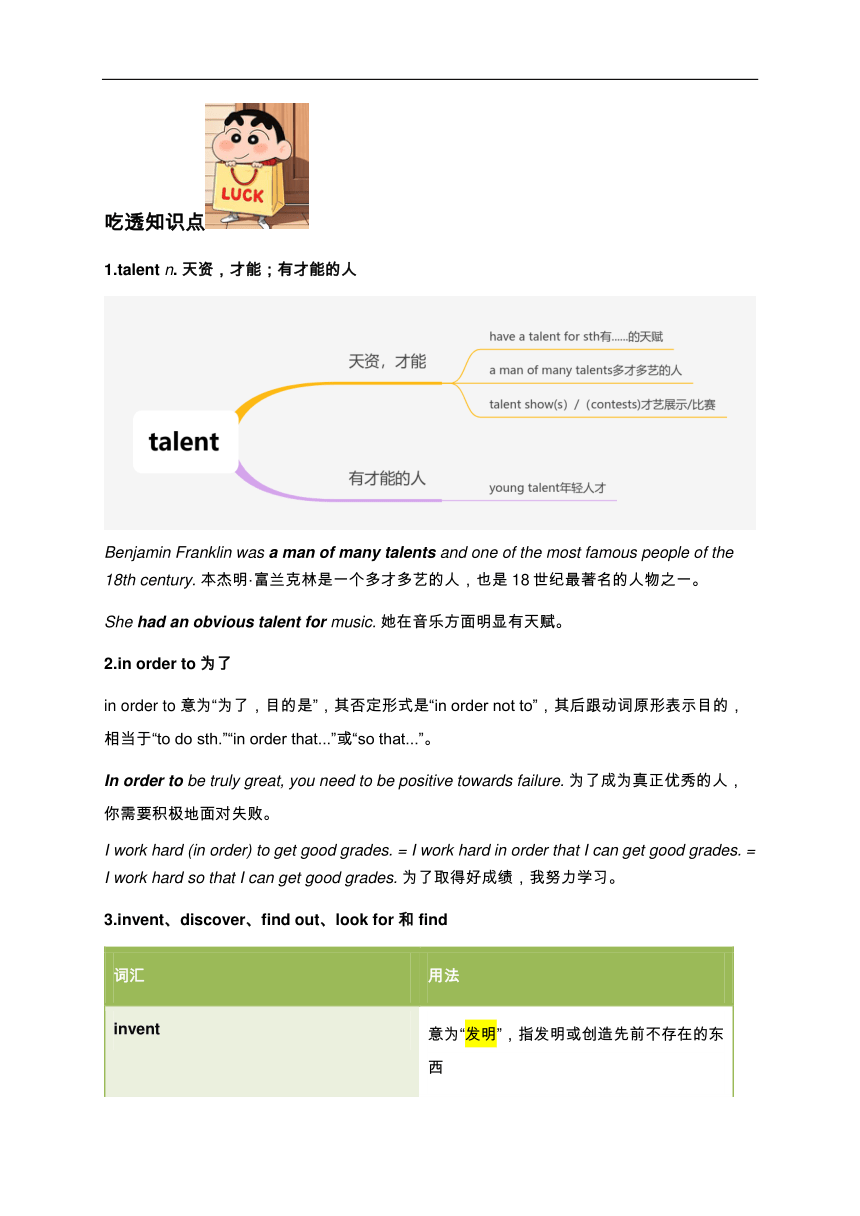
文档简介
Unit 3 To be a good learner重点知识清单
单元主题内容框架
能听懂关于学习经历的音频资料
能口头介绍学英语时遇到的问题
能读懂关于成功学习的故事
能以书面形式介绍学英语时遇到的问题及应对方法
重点单词
1.learner n. 学习者
2.feed vt. 为……提供食物;喂养
3.fish vi. 钓鱼,捕鱼
4.journey n. 旅程,旅行
5.single adj. 单个的;单身的
6.against prep. 逆,反对
7.successful adj. 有成效的;成功的
8.drive n. 冲劲;本能需求
9.guide vt. 指导;给某人领路(或导游)
10.inventor n. 发明家
11.found vt. 创建;建立
12.talent n. 天资,才能;有才能的人
13.century n. 世纪;百年
14.print n. 印刷行业
15.himself pron. 他自己
16.return vt. 归还
17.
18.curious adj. 好奇的
19.storm n. 暴风雨
20.finding n. 调查发现
21.countless adj. 数不尽的
22.invention n. 发明
23.invent vt. 发明
24.greatness n. 伟大
25.success n. 成功
26.Italian n. 意大利语;意大利人
27.themselves pron. 他(她)们,它们自己
28.conversation n. 交谈,谈话
29.translate vt.&vi. 翻译
30.page n.(书或纸张的)页
31.badly adv. 严重地,厉害地
32.yourself pron. 你自己
33.yourselves pron. 你们自己
34.record vt.&vi. 录制 vt. 记录 n. 记录;纪录
35.printer n. 印刷工,印刷商;打印机
36.possible adj. 可能的
37.sentence n. 句子
38.pronunciation n. 发音
39.grammar n. 语法
40.slowly adv. 慢速地,缓慢地
41.text n. 文本;文章
42.speech n. 演讲;说话的能力
43.aloud adv. 出声地;大声地
44.pronounce vt. 发音
45.correctly adv. 正确地
46.spelling n. 拼写
47.repeat vt. 重复
48.tourist n. 游客,观光者
词形变化
49.successful adj. → success n. → succeed v. 成功
50.guide vt. → guidance n. 指导
51.talent n. → talented adj. 有才能的
52.storm n. → stormy adj. 有暴风雨的
53.translate vt.&vi. → translation n. 翻译
54.possible adj. → impossible adj. 不可能的
重点短语
55.fall behind 落后
56.set...apart 使……突出,使……与众不同
57.in order to 为了
e as no surprise 不足为奇
59.for free 免费
60.as...as possible 尽可能……
61.rather than 而不是
62.to one's surprise 令某人惊讶的是
重点句型
63.Studying is like rowing a boat against moving water; if you don't move forward, you will fall behind. 学如逆水行舟,不进则退。
64.While working in his brother's print shop, Franklin taught himself by reading a lot. 在他哥哥的印刷厂工作期间,富兰克林通过大量阅读自学。
Period 1 Welcome to the unit
吃透知识点
1.feed vt. 为……提供食物;喂养
feed 意为“为……提供食物;喂养”,是及物动词,其后可以直接跟名词、代词等作宾语。
短语
feed sb./sth. (on) sth. = feed sth. to sb./sth. 意为“给……喂某物”。
Several children are feeding bread to the ducks. 几个小孩子在拿面包喂鸭子。
2.journey、trip 和 travel
单词 用法
journey 通常指远距离的陆地旅行,也可指车辆在规定的时间和线路内行驶
trip 通常指近距离的为了办事或消遣而进行旅行,并且往往要回到出发点(即往返旅程)
travel 泛指一般意义上的旅行,通常作不可数名词;也可用复数形式,此时指出国旅行
They went on a long train journey across India. 他们乘火车作了一次横跨印度的长途旅行。
We had to make several trips to bring all the equipment over. 我们往返了几次才把全部设备运过来。
Travel is much cheaper now than it used to be. 现在旅行比过去便宜多了。
3.against prep. 逆,反对
against 作介词,意为“逆,反对”,其后跟名词、代词或动词 -ing 形式作宾语,常与动词 play、fight、guard 等连用。
Studying is like rowing a boat against moving water; if you don't move forward, you will fall behind. 学如逆水行舟,不进则退。
延伸:
against 还有如下含义:
against 紧靠;倚;碰
He pulled the board and placed it against a corner of the well, next to the hedgehog. 他拉过木板,把它靠在井角上,就在刺猬旁边。
against 与……对阵;和……比赛
We will have a match against the red team. 我们会和红队打场比赛。
4.guide vt. 指导;给某人领路(或导游)
A good teacher will guide you on the right path. 一位好老师会指引你走上正确的道路。
Or you can visit your local library and ask a librarian to guide you to the poetry part. 或者你可以去当地的图书馆,让图书管理员领你去诗歌专区。
延伸:
guide 还作名词,意为“导游;向导;指南;手册”
短语
a guide to... 意为“……的指南”。
We hired a local guide to get us across the mountains. 我们雇了一名当地人做向导带领我们翻山越岭。
This book is a practical guide to healthy living. 这本书是健康生活的实用指南。
Period 2 Reading
吃透知识点
1.talent n. 天资,才能;有才能的人
Benjamin Franklin was a man of many talents and one of the most famous people of the 18th century. 本杰明·富兰克林是一个多才多艺的人,也是18世纪最著名的人物之一。
She had an obvious talent for music. 她在音乐方面明显有天赋。
2.in order to 为了
in order to 意为“为了,目的是”,其否定形式是“in order not to”,其后跟动词原形表示目的,相当于“to do sth.”“in order that...”或“so that...”。
In order to be truly great, you need to be positive towards failure. 为了成为真正优秀的人,你需要积极地面对失败。
I work hard (in order) to get good grades. = I work hard in order that I can get good grades. = I work hard so that I can get good grades. 为了取得好成绩,我努力学习。
3.invent、discover、find out、look for 和 find
词汇 用法
invent 意为“发明”,指发明或创造先前不存在的东西
discover 意为“发现”,多指发现先前已经存在但未被人们发现的事物、真理或情况
find out 意为“发现;查明”,多指发现某个事实、真相或者较为抽象的东西
look for 意为“寻找;找”,强调“找”的动作
find 意为“发现;找到”,多指找到具体的物品,强调“找”的结果
Who invented the steam engine 谁发明了蒸汽机?
The Curies are best known for discovering radium. 居里夫妇因发现镭而最为知名。
There is a strange sound over there. Go and find out what's happening. 那边有个奇怪的声音。去看看发生了什么事。
Where have you been We've been looking for you. 你去哪儿了?我们一直在找你。
He eventually found the book under his bed. 他最后在床底下找到了那本书。
4.success n. 成功
success 作不可数名词时,意为“成功”;作可数名词时,意为“成功的人或事物”。
As a lifelong learner, he saw learning as an exciting and endless journey, full of wonder and success. 作为一名终身学习者,他认为学习是一段令人兴奋且永无止境的旅程,充满了奇迹和成功。
延伸:
success 的派生词:
succeed v. 成功
successful adj. 成功的
successfully adv. 成功地
Period 3 Grammar & Word power
吃透知识点
1.record vt.&vi. 录制 vt. 记录 n. 记录;纪录
He even records himself playing the piano every day. 他甚至每天都会录制自己弹钢琴的样子。
You should record all your expenses during your trip. 你应该记下你一路上的所有开支。
She recorded in her diary that they broke the record on 15 June. 她在日记中记录了他们是在6月15日破纪录的。
2.构词法③:后缀 -er、-or 和 -ist
后缀 -er、-or 和 -ist 可以加在动词或名词后,构成名词,表示“与……有关的人;做……的人;从事……的人”。
动词/名词 名词
drive 驾驶 driver 驾驶员
read 阅读 reader 读者
village 村庄 villager 村民
act 扮演 actor 演员
translate 翻译 translator 翻译家
violin 小提琴 violinist 小提琴手
novel 小说 novelist 小说家
吃透语法
一、副词比较级和最高级
副词和形容词一样,通常都有原级、比较级和最高级三个等级,其构成方法也和形容词基本相同,有规则变化和不规则变化两种形式。
(一)副词比较级的用法
副词比较级是对两者(人或事物)动作或状态的程度进行比较,可以单独使用或者和 than 一起使用,修饰前面的行为动词。比较级前可用 a little、a bit、much、even 等修饰。
—Judy practices her oral English hard every day. 朱迪每天努力练习英语口语。
—So she does. She pronounces words more clearly than before. 是的,她发音比以前更清楚了。
This child does much better at school than before. 这个孩子的学习成绩比先前好多了。
(二)副词最高级的用法
副词最高级是对三者或三者以上(人或事物)动作或状态的程度进行比较,用来修饰行为动词,其前有时省略定冠词 the。
He who laughs last laughs best. 谁笑到最后,谁笑得最好。
—Who got first prize in this competition 谁在这次比赛中得了一等奖?
—Of course Tom did. He worked hardest among us. 当然是汤姆。他在我们当中最努力。
Jim ran (the) fastest of all the students at the sports meeting. 在这次运动会上,吉姆是所有学生中跑得最快的。
(三)副词比较级和最高级的变化规则
1.规则变化
分类 规则 示例
单音节词 大多数词后加 -er 或 -est long → longer → longest
多音节词和部分双音节词 在词的前面加 more 或 most carefully → more carefully → most carefully
2.常见的不规则变化
原级 比较级 最高级
well better best
badly worse worst
far farther/further farthest/furthest
little less least
much more most
二、反身代词
反身代词即人称代词的反身形式,可译为“本人;本身;亲自;自己”。反身代词和它所指代的对象在人称、性别、数上必须保持一致,在句中可以起到强调作用。
(一)反身代词的形式
第一人称和第二人称的反身代词是由形容词性物主代词加上 -self 或 -selves 构成;第三人称的反身代词是由人称代词的宾格形式加 -self 或 -selves 构成。
人称 单数 复数
第一人称 myself ourselves
第二人称 yourself yourselves
第三人称 himself;herself;itself themselves
(二)反身代词的用法
反身代词在句中可以作宾语、主语或宾语的同位语、表语。
When my parents went away on business, I looked after myself. 我父母出差时,我自己照顾自己。[作宾语]
The president himself will attend the opening ceremony. 主席亲自参加开幕式。[作主语的同位语]
We had better ask the teacher herself about it. 对此我们最好问一问老师本人。[作宾语的同位语]
Don't try to mimic anybody. You have to be yourself if you are going to do your best. 不要试图去模仿任何人。想做到最好就必须做自己。[作表语]
注意:
反身代词在句中不能单独作主语。
[×] Myself like writing poetry.
[√] I myself like writing poetry. 我本人喜欢写诗。
Period 4 Integration
吃透知识点
1.besides prep. 除……之外(还)
besides 作介词,意为“除……之外(还)”,表增添关系,其后的人或物也包括在内。
Besides working as a doctor, he also writes novels in his spare time. 除了当医生之外,他在业余时间还写小说。
易混辨析:
易混词汇 词性 含义
beside prep. 在……旁边;在……附近
besides prep. 除……之外(还)
besides adv. 而且;再说
The bookstore is on your right, beside the bank. 书店在你的右边,在银行旁边。
I don't really want to go. Besides, it's too late now. 我真的不想去。而且现在太晚了。
2.as...as possible 尽可能★★★
as...as possible 意为“尽可能”,相当于 as...as one can。
Zhao thought it was important to spend as much time as possible reading, speaking and listening to the language. 赵(元任)认为花尽可能多的时间读、说和听这种语言是重要的。
She advised him to walk as much as possible. = She advised him to walk as much as he can. 她建议他尽可能多走路。
延伸:
Ras soon as possible 意为“尽快”,强调时间上尽早,相当于 as soon as one can/could,其中 soon 是副词的原级。
People may want to finish the journey as soon as possible. 人们可能想要尽快完成旅程。
Ras quickly as possible 意为“尽可能快地”,强调的是动作快。
Hand in your answers as quickly as possible. 尽快把答案交上来。
3.every time 引导时间状语从句
Every time he went to a new place, he would talk with the locals. 每次到一个新地方,他都会和当地人交谈。
本句是含 every time 引导的时间状语从句的主从复合句,类似的词语还有 each time(每次)、next time(下次)等。
every time 引导时间状语从句时,主、从句时态如下:
(1)一般情况下,如果强调一般性、习惯性的动作,主、从句均可用一般现在时。
Every time I look through my phone, I see someone having the time of their life. 每次看手机,我总能看到有人正过得很快乐。2024 江苏盐城
(2)从句用一般过去时,主句用相应的过去时态。
She liked to be with me and I was happy every time she was pleased and smiled at me.
她喜欢和我在一起,每次她高兴地对我微笑时,我都感到很开心。2024 四川甘孜州
4. rather than 而不是
rather than 意为“而不是”,是固定短语,连接具有并列关系的词、短语或句子。
Rather than worrying about the risks of scientific technologies, we should learn to use them in a wise way and manage them well.
我们不应担心科学技术的风险,而应当学会明智地使用它们并妥善管理它们。2024 江苏南通
5. loud、aloud 与 loudly
单词 用法
单词 用法
loud 表示“大声地”,主要与talk、speak、sing、laugh等搭配使用
aloud 表示“出声地”,和shout、cry、read、think等搭配使用
loudly 暗含“喧闹地”的意思,可与任何发出声响的动词搭配使用
Do you have to play that music so loud
你非得把音乐放那么响吗?
How about reading English aloud every morning
每天早上大声朗读英语怎么样?
It is impolite to talk loudly in public places. 在公众场合大声说话是不礼貌的。
单元主题内容框架
能听懂关于学习经历的音频资料
能口头介绍学英语时遇到的问题
能读懂关于成功学习的故事
能以书面形式介绍学英语时遇到的问题及应对方法
重点单词
1.learner n. 学习者
2.feed vt. 为……提供食物;喂养
3.fish vi. 钓鱼,捕鱼
4.journey n. 旅程,旅行
5.single adj. 单个的;单身的
6.against prep. 逆,反对
7.successful adj. 有成效的;成功的
8.drive n. 冲劲;本能需求
9.guide vt. 指导;给某人领路(或导游)
10.inventor n. 发明家
11.found vt. 创建;建立
12.talent n. 天资,才能;有才能的人
13.century n. 世纪;百年
14.print n. 印刷行业
15.himself pron. 他自己
16.return vt. 归还
17.
18.curious adj. 好奇的
19.storm n. 暴风雨
20.finding n. 调查发现
21.countless adj. 数不尽的
22.invention n. 发明
23.invent vt. 发明
24.greatness n. 伟大
25.success n. 成功
26.Italian n. 意大利语;意大利人
27.themselves pron. 他(她)们,它们自己
28.conversation n. 交谈,谈话
29.translate vt.&vi. 翻译
30.page n.(书或纸张的)页
31.badly adv. 严重地,厉害地
32.yourself pron. 你自己
33.yourselves pron. 你们自己
34.record vt.&vi. 录制 vt. 记录 n. 记录;纪录
35.printer n. 印刷工,印刷商;打印机
36.possible adj. 可能的
37.sentence n. 句子
38.pronunciation n. 发音
39.grammar n. 语法
40.slowly adv. 慢速地,缓慢地
41.text n. 文本;文章
42.speech n. 演讲;说话的能力
43.aloud adv. 出声地;大声地
44.pronounce vt. 发音
45.correctly adv. 正确地
46.spelling n. 拼写
47.repeat vt. 重复
48.tourist n. 游客,观光者
词形变化
49.successful adj. → success n. → succeed v. 成功
50.guide vt. → guidance n. 指导
51.talent n. → talented adj. 有才能的
52.storm n. → stormy adj. 有暴风雨的
53.translate vt.&vi. → translation n. 翻译
54.possible adj. → impossible adj. 不可能的
重点短语
55.fall behind 落后
56.set...apart 使……突出,使……与众不同
57.in order to 为了
e as no surprise 不足为奇
59.for free 免费
60.as...as possible 尽可能……
61.rather than 而不是
62.to one's surprise 令某人惊讶的是
重点句型
63.Studying is like rowing a boat against moving water; if you don't move forward, you will fall behind. 学如逆水行舟,不进则退。
64.While working in his brother's print shop, Franklin taught himself by reading a lot. 在他哥哥的印刷厂工作期间,富兰克林通过大量阅读自学。
Period 1 Welcome to the unit
吃透知识点
1.feed vt. 为……提供食物;喂养
feed 意为“为……提供食物;喂养”,是及物动词,其后可以直接跟名词、代词等作宾语。
短语
feed sb./sth. (on) sth. = feed sth. to sb./sth. 意为“给……喂某物”。
Several children are feeding bread to the ducks. 几个小孩子在拿面包喂鸭子。
2.journey、trip 和 travel
单词 用法
journey 通常指远距离的陆地旅行,也可指车辆在规定的时间和线路内行驶
trip 通常指近距离的为了办事或消遣而进行旅行,并且往往要回到出发点(即往返旅程)
travel 泛指一般意义上的旅行,通常作不可数名词;也可用复数形式,此时指出国旅行
They went on a long train journey across India. 他们乘火车作了一次横跨印度的长途旅行。
We had to make several trips to bring all the equipment over. 我们往返了几次才把全部设备运过来。
Travel is much cheaper now than it used to be. 现在旅行比过去便宜多了。
3.against prep. 逆,反对
against 作介词,意为“逆,反对”,其后跟名词、代词或动词 -ing 形式作宾语,常与动词 play、fight、guard 等连用。
Studying is like rowing a boat against moving water; if you don't move forward, you will fall behind. 学如逆水行舟,不进则退。
延伸:
against 还有如下含义:
against 紧靠;倚;碰
He pulled the board and placed it against a corner of the well, next to the hedgehog. 他拉过木板,把它靠在井角上,就在刺猬旁边。
against 与……对阵;和……比赛
We will have a match against the red team. 我们会和红队打场比赛。
4.guide vt. 指导;给某人领路(或导游)
A good teacher will guide you on the right path. 一位好老师会指引你走上正确的道路。
Or you can visit your local library and ask a librarian to guide you to the poetry part. 或者你可以去当地的图书馆,让图书管理员领你去诗歌专区。
延伸:
guide 还作名词,意为“导游;向导;指南;手册”
短语
a guide to... 意为“……的指南”。
We hired a local guide to get us across the mountains. 我们雇了一名当地人做向导带领我们翻山越岭。
This book is a practical guide to healthy living. 这本书是健康生活的实用指南。
Period 2 Reading
吃透知识点
1.talent n. 天资,才能;有才能的人
Benjamin Franklin was a man of many talents and one of the most famous people of the 18th century. 本杰明·富兰克林是一个多才多艺的人,也是18世纪最著名的人物之一。
She had an obvious talent for music. 她在音乐方面明显有天赋。
2.in order to 为了
in order to 意为“为了,目的是”,其否定形式是“in order not to”,其后跟动词原形表示目的,相当于“to do sth.”“in order that...”或“so that...”。
In order to be truly great, you need to be positive towards failure. 为了成为真正优秀的人,你需要积极地面对失败。
I work hard (in order) to get good grades. = I work hard in order that I can get good grades. = I work hard so that I can get good grades. 为了取得好成绩,我努力学习。
3.invent、discover、find out、look for 和 find
词汇 用法
invent 意为“发明”,指发明或创造先前不存在的东西
discover 意为“发现”,多指发现先前已经存在但未被人们发现的事物、真理或情况
find out 意为“发现;查明”,多指发现某个事实、真相或者较为抽象的东西
look for 意为“寻找;找”,强调“找”的动作
find 意为“发现;找到”,多指找到具体的物品,强调“找”的结果
Who invented the steam engine 谁发明了蒸汽机?
The Curies are best known for discovering radium. 居里夫妇因发现镭而最为知名。
There is a strange sound over there. Go and find out what's happening. 那边有个奇怪的声音。去看看发生了什么事。
Where have you been We've been looking for you. 你去哪儿了?我们一直在找你。
He eventually found the book under his bed. 他最后在床底下找到了那本书。
4.success n. 成功
success 作不可数名词时,意为“成功”;作可数名词时,意为“成功的人或事物”。
As a lifelong learner, he saw learning as an exciting and endless journey, full of wonder and success. 作为一名终身学习者,他认为学习是一段令人兴奋且永无止境的旅程,充满了奇迹和成功。
延伸:
success 的派生词:
succeed v. 成功
successful adj. 成功的
successfully adv. 成功地
Period 3 Grammar & Word power
吃透知识点
1.record vt.&vi. 录制 vt. 记录 n. 记录;纪录
He even records himself playing the piano every day. 他甚至每天都会录制自己弹钢琴的样子。
You should record all your expenses during your trip. 你应该记下你一路上的所有开支。
She recorded in her diary that they broke the record on 15 June. 她在日记中记录了他们是在6月15日破纪录的。
2.构词法③:后缀 -er、-or 和 -ist
后缀 -er、-or 和 -ist 可以加在动词或名词后,构成名词,表示“与……有关的人;做……的人;从事……的人”。
动词/名词 名词
drive 驾驶 driver 驾驶员
read 阅读 reader 读者
village 村庄 villager 村民
act 扮演 actor 演员
translate 翻译 translator 翻译家
violin 小提琴 violinist 小提琴手
novel 小说 novelist 小说家
吃透语法
一、副词比较级和最高级
副词和形容词一样,通常都有原级、比较级和最高级三个等级,其构成方法也和形容词基本相同,有规则变化和不规则变化两种形式。
(一)副词比较级的用法
副词比较级是对两者(人或事物)动作或状态的程度进行比较,可以单独使用或者和 than 一起使用,修饰前面的行为动词。比较级前可用 a little、a bit、much、even 等修饰。
—Judy practices her oral English hard every day. 朱迪每天努力练习英语口语。
—So she does. She pronounces words more clearly than before. 是的,她发音比以前更清楚了。
This child does much better at school than before. 这个孩子的学习成绩比先前好多了。
(二)副词最高级的用法
副词最高级是对三者或三者以上(人或事物)动作或状态的程度进行比较,用来修饰行为动词,其前有时省略定冠词 the。
He who laughs last laughs best. 谁笑到最后,谁笑得最好。
—Who got first prize in this competition 谁在这次比赛中得了一等奖?
—Of course Tom did. He worked hardest among us. 当然是汤姆。他在我们当中最努力。
Jim ran (the) fastest of all the students at the sports meeting. 在这次运动会上,吉姆是所有学生中跑得最快的。
(三)副词比较级和最高级的变化规则
1.规则变化
分类 规则 示例
单音节词 大多数词后加 -er 或 -est long → longer → longest
多音节词和部分双音节词 在词的前面加 more 或 most carefully → more carefully → most carefully
2.常见的不规则变化
原级 比较级 最高级
well better best
badly worse worst
far farther/further farthest/furthest
little less least
much more most
二、反身代词
反身代词即人称代词的反身形式,可译为“本人;本身;亲自;自己”。反身代词和它所指代的对象在人称、性别、数上必须保持一致,在句中可以起到强调作用。
(一)反身代词的形式
第一人称和第二人称的反身代词是由形容词性物主代词加上 -self 或 -selves 构成;第三人称的反身代词是由人称代词的宾格形式加 -self 或 -selves 构成。
人称 单数 复数
第一人称 myself ourselves
第二人称 yourself yourselves
第三人称 himself;herself;itself themselves
(二)反身代词的用法
反身代词在句中可以作宾语、主语或宾语的同位语、表语。
When my parents went away on business, I looked after myself. 我父母出差时,我自己照顾自己。[作宾语]
The president himself will attend the opening ceremony. 主席亲自参加开幕式。[作主语的同位语]
We had better ask the teacher herself about it. 对此我们最好问一问老师本人。[作宾语的同位语]
Don't try to mimic anybody. You have to be yourself if you are going to do your best. 不要试图去模仿任何人。想做到最好就必须做自己。[作表语]
注意:
反身代词在句中不能单独作主语。
[×] Myself like writing poetry.
[√] I myself like writing poetry. 我本人喜欢写诗。
Period 4 Integration
吃透知识点
1.besides prep. 除……之外(还)
besides 作介词,意为“除……之外(还)”,表增添关系,其后的人或物也包括在内。
Besides working as a doctor, he also writes novels in his spare time. 除了当医生之外,他在业余时间还写小说。
易混辨析:
易混词汇 词性 含义
beside prep. 在……旁边;在……附近
besides prep. 除……之外(还)
besides adv. 而且;再说
The bookstore is on your right, beside the bank. 书店在你的右边,在银行旁边。
I don't really want to go. Besides, it's too late now. 我真的不想去。而且现在太晚了。
2.as...as possible 尽可能★★★
as...as possible 意为“尽可能”,相当于 as...as one can。
Zhao thought it was important to spend as much time as possible reading, speaking and listening to the language. 赵(元任)认为花尽可能多的时间读、说和听这种语言是重要的。
She advised him to walk as much as possible. = She advised him to walk as much as he can. 她建议他尽可能多走路。
延伸:
Ras soon as possible 意为“尽快”,强调时间上尽早,相当于 as soon as one can/could,其中 soon 是副词的原级。
People may want to finish the journey as soon as possible. 人们可能想要尽快完成旅程。
Ras quickly as possible 意为“尽可能快地”,强调的是动作快。
Hand in your answers as quickly as possible. 尽快把答案交上来。
3.every time 引导时间状语从句
Every time he went to a new place, he would talk with the locals. 每次到一个新地方,他都会和当地人交谈。
本句是含 every time 引导的时间状语从句的主从复合句,类似的词语还有 each time(每次)、next time(下次)等。
every time 引导时间状语从句时,主、从句时态如下:
(1)一般情况下,如果强调一般性、习惯性的动作,主、从句均可用一般现在时。
Every time I look through my phone, I see someone having the time of their life. 每次看手机,我总能看到有人正过得很快乐。2024 江苏盐城
(2)从句用一般过去时,主句用相应的过去时态。
She liked to be with me and I was happy every time she was pleased and smiled at me.
她喜欢和我在一起,每次她高兴地对我微笑时,我都感到很开心。2024 四川甘孜州
4. rather than 而不是
rather than 意为“而不是”,是固定短语,连接具有并列关系的词、短语或句子。
Rather than worrying about the risks of scientific technologies, we should learn to use them in a wise way and manage them well.
我们不应担心科学技术的风险,而应当学会明智地使用它们并妥善管理它们。2024 江苏南通
5. loud、aloud 与 loudly
单词 用法
单词 用法
loud 表示“大声地”,主要与talk、speak、sing、laugh等搭配使用
aloud 表示“出声地”,和shout、cry、read、think等搭配使用
loudly 暗含“喧闹地”的意思,可与任何发出声响的动词搭配使用
Do you have to play that music so loud
你非得把音乐放那么响吗?
How about reading English aloud every morning
每天早上大声朗读英语怎么样?
It is impolite to talk loudly in public places. 在公众场合大声说话是不礼貌的。
同课章节目录
